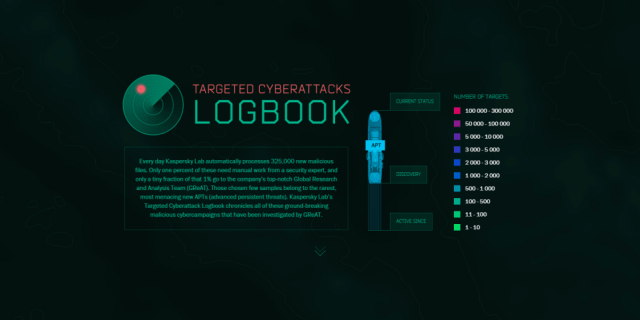
Kaspersky Small Office Security: a new version available
The necessity of a product that is positioned in-between the enterprise-level suites and home-users solutions became apparent only a few years ago.
772 articles

The necessity of a product that is positioned in-between the enterprise-level suites and home-users solutions became apparent only a few years ago.

Every security vendor has a portfolio of advanced “anti-malware technologies” that make its products good and even better than all the rest.

The word “IoT” (Internet of Things) has been a buzz word for several years now. It has become the era when more home electronics and cars are connected to the

Losing a phone is always a bit of a nuisance, especially if it’s an expensive piece of hardware. With smartphones conquering the world with authority, losing a phone means also

Crouching Yeti, last year’s widely publicized APT campaign, is apparently still active, although the operator might have switched infrastructure, techniques, and targets.

The design of the current smartwatches is defined by being aimed at geeks. It looks like it will again take Apple to perform its duties carefully iSplaining wearables to ordinary people.

During my first two weeks of the biochip experience I had time to mull over a lot of things. In this post I’m going to touch upon the subject of form factor.

It can be hard for businesses to keep in mind everything they need to do to be protected. We have identified five trends in cybersecurity that are affecting businesses, directly or indirectly, at a formidable level.

What are the key differences between Kaspersky Total Security and Kaspersky Internet Security? Which is the best choice for you? Which protects better? Let’s take a closer look.

Comparing the worst passwords of 2014 with the infamous top 50 passwords from the Gawker Media breach in 2010.

There are various ways to assess the threat landscape, but it’s what companies think of it that is most important. We decided to pick the top 10 events of 2014 by a single criterion: the popularity of the corresponding stories. And here is what we came up with.

2014 is over, as are the holidays. Time to look back at the business security highlights of past the year.

The number of corporate-targeting attacks increased this year more than two times compared to 2013. Why?

Kaspersky Lab launches “Targeted Attacks Logbook” – a visual tool to monitor known Advanced Persistent Threats. In this post, we take a look at how to handle this pretty instrument.

Kaspersky Lab experts shared their predictions on the evolution of APT. While these predictions may not come true, they are based on facts and trends already observed.

Sony Pictures Entertainment fell victim to a massive hack. Attackers used destructive malware to bring SPE networks down, while stealing up to 11 TB of data, which included both trade secrets, yellow press fodder, passwords to social networks accounts, and a lot of private information.

Kaspersky Lab experts analyze the security and privacy trends that emerged in 2014, including anonymous Tor browsing, ransomware, APT attacks and more.

There are some good reasons to spend years researching high-profile cyberthreats. But we do our best to protect our customers from the latest threats even before the investigation has concluded. Here’s how.


Let’s take a moment to discuss the numerous troubles that our bright, technology-packed future could bring about.

The Electronic Frontier Foundation recently graded a slew of mobile and Internet messaging services based on security and privacy. Here we detail the top scorers.